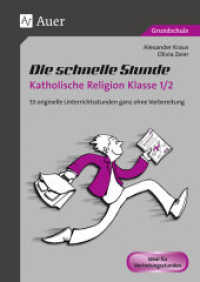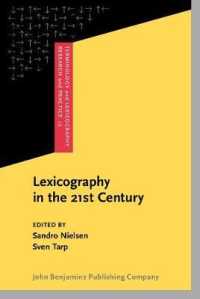- ホーム
- > 洋書
- > 英文書
- > Politics / International Relations
Full Description
Why and how did Islam become such a political force in so many Muslim-majority countries? In this book, Jocelyne Cesari investigates the relationship between modernization, politics, and Islam in Muslim-majority countries such as Egypt, Iraq, Pakistan, Tunisia, and Turkey - countries that were founded by secular rulers and have since undergone secularized politics. Cesari argues that nation-building processes in these states have not created liberal democracies in the Western mold, but have instead spurred the politicization of Islam by turning it into a modern national ideology. Looking closely at examples of Islamic dominance in political modernization, this study provides a unique overview of the historical and political developments from the end of World War II to the Arab Spring that have made Islam the dominant force in the construction of the modern states, and discusses Islam's impact on emerging democracies in the contemporary Middle East.
Contents
Part I. The Making of Islam as a Modern Religion: 1. Modernization and politicization of religion; 2. Nation-state building and the inclusion of Muslim polities within the Westphalian order; 3. Islam in the constitution; 4. Nationalization of Islamic institutions and clerics; 5. Islam in the legal system; 6. Teaching Islam in public schools; Part II. Islamism as the Central Political Force Pre- and Post-Arab Spring: 7. Political opposition through Islamic institutions; 8. Ideological strength of Islamist opposition; 9. From martyrs to rulers; Part III. The Disjunction of Democracy and Secularism - Lessons Learned from the Arab Spring: 10. The rise of unsecular democracies: the conundrum of religious freedom in Muslim democracies; 11. The way forward: the role of Islam in future democratizations; Conclusion. The tragedy of modernity.








